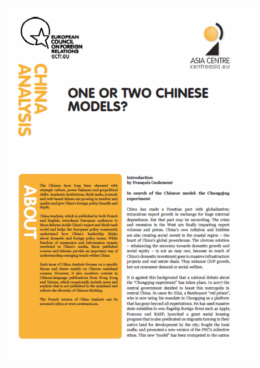China Analysis: One or two Chinese models?
To Chongqing or Guangdong? China’s big development decision
The pact that China has made with globalisation, trading huge external dependence for miraculous export growth, may be unravelling.The crisis in the West is hurting exports, and inflation and bubbles at home are creating unrest in the vital coastal regions. With a crucial contest for Chinese leadership in 2012, Beijing is involved in a crucial debate about the value of two competing models of development that will influence who leads the country and its future direction.
The Chongqing experiment is based around a metropolis in Central China, which has – under the leadership of Bo Xilai – used massive state subsidies to woo flagship foreign firms like Apple, launched a giant social housing programme and fought the mafia.
The rival Guangdong model from Canton is instead based upon moving up the technological value chain, reinforcing the rule of law and representation of the people by NGOs.
The latest edition of China Analysis (‘One or two Chinese models?’), published by ECFR and Asia Centre, explores this debate over China’s future development, and the role the debate plays in the contest for leadership in Beijing.
-
The Chongqing model is an investment in the next wave of export-led growth by the mobilisation of inland Chinese assets, providing the growth needed to . But a slowdown in international demand could make this investment a risky proposition.
-
The Guangdong model involves a realignment of the Chinese economyaway from export-driven GDP growth that is less capable of providing internal consumer demand or social welfare. Both are viewed as big issues that need resolving as the Chinese economy matures.
-
Both models have high level proponents, ahead of the replacing of seven of the nine Politburo Standing Committee members (the top table of Chinese politics). This debate has consequently become as critical as the debate over internationalisation of China’s currency.
- If the international economic slowdown harms exports, the debate could become acrimonious, involving job displacement, lost subsidies and China’s future development.
“As the world watches how China’s economy will react to the double dip in the advanced Western economies, the debate won’t just be an economic one. Rather, it will involve power politics and how best to preserve the legitimacy of the Chinese Communist Party in a strong headwind.”François Godement
The European Council on Foreign Relations does not take collective positions. ECFR publications only represent the views of their individual authors.



